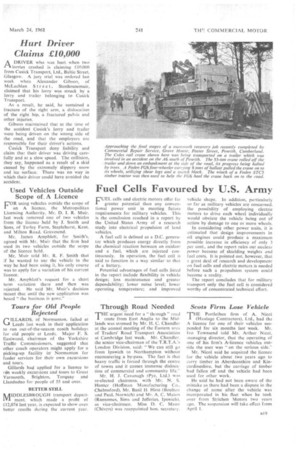Fuel Cells Favoured by U.S. Army
Page 53

If you've noticed an error in this article please click here to report it so we can fix it.
rUEL cells and electric motors offer far 1 greater potential than any conventional power unit in meeting future requirements for military vehicles. This Ii. the conclusion reached in areport by the United States Army of a research study into electrical propulsion of land vehicles.
A fuel cell is defined as a D.C. generator which produces energy directly from the chemical reaction between an oxidant and a fuel, which are injected continuously. In operation, the fuel cell is said to function in a way similar to that of a battery. Potential advantages of fuel cells listed in the report include flexibility in vehicle design; less maintenance and greater dependability; lower noise level; lower operating temperature; and improved vehicle shape. In addition, particularly so far as military vehicles are concerned. the possibility of employing electric motors to drive each wheel individually would obviate the vehicle being out of action by damage to one or more wheels. In considering other power units, it is estimated that design improvements in oil engines could produce a maximum possible increase in efficiency of only 3 per cent., and the report rules out nuclear power because of shielding weights and fuel costs. It is pointed out, however, that a great deal of research and development on fuel cells and electric motors is needed before such a propulsion system could become a reality.
The report concludes that for military transport only the fuel cell is considered worthy of concentrated technical effort.




































































































































